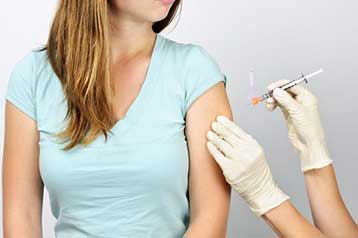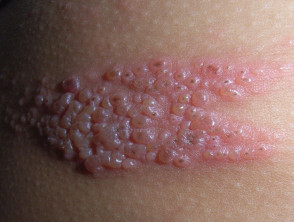Pertussis
Adults and Teens
What is pertussis or whooping cough?
Whooping cough, also known as pertussis, is a serious infection that spreads easily from person to person. The infection causes coughing spells so severe that it can be hard to breathe, eat, or sleep. Pertussis can lead to pneumonia or hospitalization. Although whooping cough can make adults very sick, another big concern is that adults are the most common source of infection in babies, who are at the highest risk of dying from it. In 2010, 25 American infants younger than one year died from whooping cough.
Whooping cough has been on the rise in the US since an all-time low of just over 1,000 cases were reported in 1976. While 27,550 cases were reported to the US Centers for Disease Control and Prevention (CDC) in 2010, the vast majority of cases are not reported and estimates of actual cases range from one to three million cases annually.
Symptoms
Early symptoms of whooping cough are similar to the common cold or bronchitis and may include runny nose, sneezing, and low-grade fever. Coughing spasms become progressively worse, and can be accompanied by vomiting or urinary incontinence. Sometimes a “whoop” sound occurs while gasping for breath at the end of a coughing spell. Adults rarely have the classic “whoop,” but the cough spasms can last for weeks or even months.
Prevention
Whooping cough is most contagious before the coughing starts, so the most effective way to prevent it is through immunization. The whooping cough booster vaccine for adults (and adolescents) is called Tdap (tetanus-diphtheria-acellular pertussis). Younger children get a different formulation, called DTaP. Both protect against tetanus, diphtheria, and pertussis.
Who should get the Tdap vaccine?
- The CDC recommends that adults age 19 to 64 years receive a single dose of Tdap in place of the next Td (tetanus-diphtheria) booster recommended every 10 years. CDC also recommends a Tdap vaccine for adults age 65 years and older who have, or who anticipate having close contact with an infant younger than 12 months. In addition, the CDC has issued recommendations for specific adult populations to get a Tdap booster without waiting for the usual 10-year interval for Td; this includes:
- Pregnant women preferably late in the second trimester or during the third trimester (after 20 weeks). If she is not vaccinated during pregnancy, then she should be vaccinated immediately after delivery, before discharge from the hospital or birthing center.
- Adults, regardless of age, who have or who anticipate having close contact with infants younger than 12 months (eg, parents, grandparents younger than 65 years of age, childcare providers), ideally at least two weeks before beginning close contact with the infant.
- All healthcare personnel in hospitals or ambulatory care settings. Priority is given to vaccination of workers in direct contact with infants younger than 12 months.
- Pregnant women preferably late in the second trimester or during the third trimester (after 20 weeks). If she is not vaccinated during pregnancy, then she should be vaccinated immediately after delivery, before discharge from the hospital or birthing center.
Vaccine safety
The Tdap vaccine is safe. Reactions to the vaccine are usually mild. The most common reactions after vaccination are pain and redness at the injection site. Other adverse events are possible. A healthcare professional should be informed if you have developed Guillain-Barré syndrome within six weeks following a prior tetanus vaccination, if you are pregnant or nursing, or if you have experienced arthus-type hypersensitivity reactions (ie, rare but severe, exaggerated local reactions) following a prior tetanus vaccine. The potential risks associated with pertussis are much greater than the potential risks associated with the vaccine. You cannot get pertussis from the vaccine.
Disease and vaccine facts
- FACT: A booster vaccine for adolescents and adults, known as Tdap (tetanus-diphtheria-acellular pertussis), protects against pertussis or “whooping cough.”
- FACT: The CDC recommends that adults receive a single dose of Tdap in place of one Td (tetanus-diphtheria) booster, which is recommended every 10 years for adults.
- FACT: Certain adults should not wait to get their Tdap vaccine, including adults in close contact with infants younger than 12 months of age, healthcare personnel—especially those in direct contact with infants younger than 12 months of age—and pregnant women who should receive a single dose of Tdap preferably during the third or late second trimester (after 20 weeks). If not administered during pregnancy, women should be vaccinated immediately after delivery.
- FACT: Whooping cough is a serious infectious disease that has been on the rise in the US over the last decade, across all age groups.
- FACT: Protection against pertussis from early childhood vaccines wears off, leaving adults and adolescents at risk for infection.
- FACT: The Chinese refer to pertussis as the “cough of 100 days” due to the prolonged, dry cough that is experienced by infected individuals.
- FACT: Whooping cough can be difficult to diagnose because early symptoms may appear like the common cold or bronchitis.
- FACT: Whooping cough causes coughing spells that can affect breathing, eating, and sleeping. It can even lead to cracked ribs and hospitalization.
- FACT: Whooping cough causes coughing that lasts for weeks, even months. Sometimes a “whoop” sound occurs while gasping for breath during a bad coughing spell. However, adults rarely have the classic “whoop.”
- FACT: The vast majority of cases are not reported. While 27,550 cases of whooping cough were reported to the CDC in
2010, experts estimate that the true number may actually be one to three million cases annually. - FACT: Adults are the most common spreaders of pertussis to infants who have had all of their vaccines. Infants have the highest rates of pertussis-related death.
- FACT: Parents, grandparents, and older siblings are often the source of pertussis in infantsFACT: Tetanus can be prevented with safe and effective vaccines






